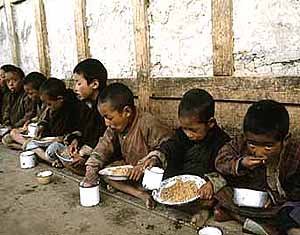18.12.2008
December 12, 2008 (The date of publication in Russian)
Alexei Chichkin
THE THIRD WORLD'S "HOLODOMOR"
Why African and Ibero-American nations are forced to fill the pantries of the "golden billion"
 Every year, the number of starving people on the globe is increasing by several millions. Paradoxically, most of the nations where people are starving belong to the array of long-term suppliers of agricultural production to the West. Having even no food processing industry of their own, they are forced to sell their crops for a song. The list of suppliers includes former colonies and protectorates of Western powers, now hypocritically qualified as "developing nations". According to UN FAO and UN's economic commissions for Africa, Western Asia, Latin America, the Caribbean, and the Sahel Council, the potential reserves of these nations are sufficient for feeding at least half of the world's population. In case these countries develop modern agrochemical technologies and food processing, they will get rid of the threat of famine.
Every year, the number of starving people on the globe is increasing by several millions. Paradoxically, most of the nations where people are starving belong to the array of long-term suppliers of agricultural production to the West. Having even no food processing industry of their own, they are forced to sell their crops for a song. The list of suppliers includes former colonies and protectorates of Western powers, now hypocritically qualified as "developing nations". According to UN FAO and UN's economic commissions for Africa, Western Asia, Latin America, the Caribbean, and the Sahel Council, the potential reserves of these nations are sufficient for feeding at least half of the world's population. In case these countries develop modern agrochemical technologies and food processing, they will get rid of the threat of famine.
Still, the process we witness is opposite. Why? Firstly, the reserves of agricultural lands in industrial nations are exhausted. However, Western countries dispose modern food processing facilities that use African, Asian, and Ibero-American raw materials. The owners of those industries are doing the best to spend the smallest amount of raw materials for a unit of the end product. Ostensibly, this parsimony favors the suppliers and their domestic industry. However, the amounts of exports from "developing nations" are promptly increasing.
This fact is explained with the commitment of the "golden billion" to store food for decades ahead. Meanwhile, the mechanism of enslavement of Third World countries is very similar to serfdom with bondhold and gavel. First, a sub-Saharan nation receives guarantees of credits, qualified cadres, agricultural technique, fertilizers, seeds etc. In exchange, Western countries are granted the possibility to buy up the whole harvest. In practice, this policy leads to shortage of food and simultaneously, to unprofitability of domestic food production in Third World nations. Their financial resources are meagre while the already high dependence from imports of food products only increases.
According to UNFAO and Sahel Council estimates, at least 60% of the global food trade is produced from post-colonial consumer goods. Meanwhile, the whole global agricultural trade is run through stock exchanges in one-time mother countries. In other words, the ultimate price for food products is determined not in Africa, Asia and Latin America, but in North America and Western Europe. Formally withdrawing from colonies and protectorates, Western powers retain their economic influence there, wringing out the remains of resources with assistance from corporations that cheaply buy raw products. It is noteworthy that the Third World nations have to pay back debts to Western nations and international financial structures – also in exchange for processed goods.
In addition, IMF's recommendations forbid most of developing nations to introduce high duties for export of their raw agricultural materials and for striking independent agricultural export deals.
Remember that most of agrarian nations of Africa are intimately connected with the EU (via the so-called Conventions of Lome), being obliged to direct all of its goods to the Euroregion, and to buy processed food, agro-industrial machinery and fertilizers. Thus, the developing nations are doomed for pecking food from the master's hand.
During last years, the food rope on the neck of the poorest nations is tightening more and more, In order to increase dependence of developing nations from ready-made food, agricultural lands are sold for producing biofuel from local raw materials. This happens even in Mexico that is regarded as an "equal partner" of the United States. In particular, a rapid price hike for corn in Mexico aroused massive protests. Corn, traditionally used by Mexicans as a major food article, was used by a US company for production of agrodiesel, thus guaranteeing it a right to buy Mexican corn for nothing.
The examples of Burkina Faso, Niger, and Chad are most illustrative. In 2000-2007, the amount of delivery of agricultural goods from these nations was by15% larger than in 1990s. Meanwhile, purchase prices increased not more than by 6-8%, while over 55% of the amount of exports was provided for expense of their debt to the West. On the other hand, the amount of imported food has grown by 20% since the 1990s, while its price increased by 14%.
The same model is pursued by the United States and Canada in their relationship with the poorest states of Ibero-America. This year's imports from Haiti and the Dominican Republic by 15% exceeded the 2002-2003 level. Over three fourths of these deliveries are used for paying back the foreign arrearage. Not surprisingly, these nations are frequently paralyzed with hungry riots. A similar dynamic of agricultural trade is typical for the nations now finding themselves in the "belt of famine". Obviously, this is the true explanation of the deficit and high prices for food products in the traditionally agrarian countries of the South.
On this background, the campaign for the Ukrainian "Holodomor" of 1933 unleashed by Anglo-American media looks especially cynical. Accusing Russia of the mythological "genocide", the West's industrial nations deliberately organize a perfectly real managed starvation of the Third World's poorest peoples.
Number of shows: 1233
 ENG
ENG 

 ENG
ENG 
